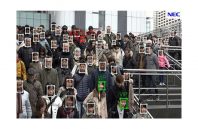In a June 24, 2019 article from Sally Ward-Foxton, EET Asia reports “The Current Reality of Facial Recognition,” emphasizing that while technology has advanced, it still has a long way to go. The article begins by stating that “The UK is one of the most surveilled countries in the world, with closed-circuit televisions (CCTV) cameras everywhere, from shops to buses to private homes. In the last couple of years, AI techniques, such as neural networks, have propelled large-scale automated facial recognition. Combined with the UK’s huge network of existing CCTV cameras, this could hold vast potential for security applications.”
But the system has challenges to overcome. “However, there are worrying implications for privacy. Biometric facial data taken from photos or CCTV footage is particularly troubling because it can be taken without the person’s consent and without them knowing about it. This data may be collected indiscriminately–whether the subject is matched with a watch list or not–and it allows people to be located and for their movements to be tracked. It’s easy to imagine photos of crowds with every face linked to the person’s identity, then potentially connected to all kinds of other data about them.

 (585) 768-2513
(585) 768-2513

